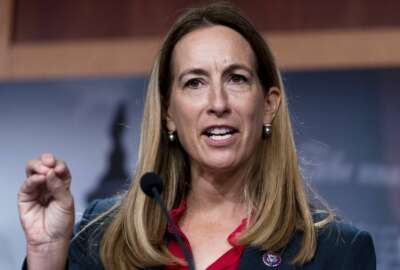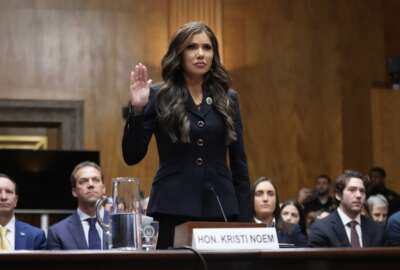Group of House Dems ask Trump to give up federal hiring freeze
In today's Top Federal Headlines, Congressman Stephen Lynch (D-MA) and more than 100 other Democrats want President-elect Trump to ditch the idea of a federal...
The Federal Headlines is a daily compilation of the stories you hear discussed on Federal Drive with Tom Temin.
In today’s Top Federal Headlines, Rep. Stephen Lynch (D-Mass.) and more than 100 other Democrats want President-elect Trump to ditch the idea of a federal workforce hiring freeze.
- Rep. Stephen Lynch (D-Mass.) and more than 100 other House Democrats want the President-elect to give up the idea of a federal workforce hiring freeze. They say the freeze would prevent agencies from filling mission-critical skills gaps and recruiting top talent. In a letter, they reference a Government Accountability Office study, which says past federal hiring freezes did little to control federal employment. (Rep. Stephen Lynch)
- Those who owe back taxes may find it tougher to join the federal workforce. Chairman of the House Oversight Committee Jason Chaffetz (R-Utah) has introduced the Tax Accountability Act. The proposed legislation would block individuals with “seriously delinquent tax debt” from working for the government, or getting federal contracts or grants. (House Oversight and Government Reform Committee)
- The Air Force is relaxing some policies to help boost recruitment. Prior use of marijuana will no longer exclude you from joining the Air Force. Those who smoked marijuana in the past and have not been charged with a crime will not be disqualified from joining the service. Smoking it once you are in the Air Force is still forbidden. The service has also loosened its tattoo policy. It’s lifting its 25 percent rule for chest, back, arms, and legs. The new policy opens waivers to new diseases as well, like asthma, ADHD, and mild eczema. (Federal News Radio)
- Gen. John Kelly easily won over the Senate Homeland Security and Governmental Affairs Committee at his nomination hearing. Kelly is the President-elect’s pick to be the new Homeland Security Department secretary. He said he’ll bring some ideas from the Defense Department to DHS. For instance, DoD’s acquisition training corps and its relationships with industry in the cyber field. (Federal News Radio)
- The Senate appears poised to give retired Gen. James Mattis the nod as Defense Secretary. Mattis’s main obstacle is a federal statute that requires general officers to have been retired for at least seven years before becoming Defense secretary. In a Senate Armed Services Committee hearing on Tuesday, no senators expressed outright opposition to a one-time waiver of that law, but Defense experts cautioned that Congress needs to make it extremely clear that this is an unusual circumstance. Sen. Jack Reed (D-R.I.), the Committee’s ranking Democrat, did express concerns about undermining civilian control of the military.
- The State Department and Department of Defense earn most improved marks when it comes to communicating clearly with the public. The Center for Plain Language released its 2016 report card, scoring agencies on how clearly they provide information on widely used documents. Out of the 18 participating agencies, the Justice Department earned the lowest grade of a “C.” (Federal News Radio)
- Too many federal websites are lacking a crucial but basic security precaution. An analysis by the General Services Administration’s 18F group found some 10,000 federal sites failed to use hypertext transfer protocol secure. They still use plain HTTP. That makes them needlessly vulnerable to hacking with man-in-the-middle attacks. Bloomberg Government reports, outgoing Federal CIO Tony Scott had tried to get the secure protocol on all sites by the end of 2016. (18F)
- New rules are out to ensure federal employees with disabilities can use technology at work. Agencies will have about a year to implement new standards for technology under Section 508 of the Rehabilitation Act. The U.S. Access Board released a final rule that updates accessibility requirements for information and communication technology in the federal sector. The rule also refreshes guidelines for telecommunications equipment which fall under Section 255 of the Communications Act. The Access Board proposed the changes to sections 508 and 255 three times since 2010, including most recently in February 2015. These guidelines haven’t been updated since 2000. (U.S. Access Board)
- Four ranking members of key House committees urge President-elect Donald Trump to quickly name a new chairman and fill out the remaining 3 out of 5 spots on the Privacy and Civil Liberties Oversight Board. They said it plays an important role in providing unbiased oversight and recommendations to the government. The board is in charge of reviewing counterterrorism actions by agencies. (House Committee on Homeland Security Democrats)
Copyright © 2025 Federal News Network. All rights reserved. This website is not intended for users located within the European Economic Area.
Eric White
Eric White is news anchor and Federal Drive producer at Federal News Network.
Follow @FEDERALNEWSCAST
Related Stories
Related Topics






